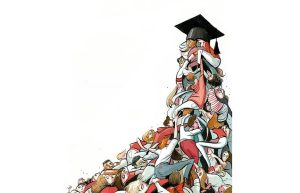A few Fridays ago, I met Tablet magazine’s incomparable Liel Leibovitz for breakfast. Over inedible gluten-free banana bread, we caught up on everything from Covid to religion, politics and pop culture. The conversation took a depressing turn, as so many seem to these days.
I asked Liel if he had seen some recent ridiculous news — now too distant and unremarkable to even remember — but which highlighted the extreme hypocrisy and self-defeating brokenness of our society. He said that he had, and added: “Isn’t it great?”
“Great?” I asked.
“Great,” he said. “Just terrific. Things like this make me giddily optimistic.”
Liel shared his philosophy with me while we walked to the Upper East Side’s premier kosher butcher — Park East. By the time we reached the store, his infectious optimism had won me over. I haven’t looked back since.
Why was Liel so cheery? Politics, culture and faith all operate on a pendulum. Humanity swings one way, then the other, sometimes sharply, sometimes gradually. And Liel reckons we are approaching that moment when things suddenly start to move in the opposite direction. So, with every cancellation, every example of institutional failure, every shelving of basic concepts of fairness and merit in the name of the current intellectual fad, every gender- or race-specific job listing, Liel rejoices.
If this seems overly upbeat, consider just how long we’ve been griping about the new world order. Ten years ago, I sat in a Barnard hallway with my RA and new hallmates. We were all instructed to introduce ourselves and our “PGPs.” No one bothered explaining what that meant. By the time it was my turn in the round robin, several women ahead of me had said “my PGPs are she, her and hers.” So I did the same. But it wasn’t until the following week that I learned that PGP stood for “preferred gender pronoun.” When I told my family about what had transpired, they laughed it off as the predictable political correctness that is comes with the territory at a liberal arts college. But now, a decade later, millions of Americans are putting pronouns in their Zoom boxes, in their email signatures, and on their business cards — and not all by choice. We’ve taken something that started small and respectful — a humane wish to respect all people, including those who identify with a different gender than the one to which they were born — and turned it into something universal and oppressive.
This conversation has seemed remote to a lot of people until recently. Lia Thomas’s college-swimming career is the latest case to bring the topic of trans accommodation into the mainstream. The outrage felt by normal, dare I say even progressive people, at the unfairness of someone born male storming to victory in the national championships has koshered the conversation.
It was only four years ago that I had to resign from Business Insider after editors removed from the website an article in which I argued that actors — wait for it — should be allowed to act, and that you don’t necessarily have to be a trans person to play one in a movie. I was accused of being bigoted, intolerant and transphobic — all things I am not. Although I now consider being canceled a badge of honor, at the time I was scared and forlorn. But thank sto Lia’s winning streak, it’s getting easier to point out some of the problems with the wholesale acceptance of trans ideology.
It was also about a decade ago that my mother, a New York real-estate broker, found herself the unwitting subject of a newspaper cartoon, now hanging in our home. There’s a drawing of her with a thought bubble that says “So many lovely apartments… so little I can say about them.” She had sat in a lecture with dozens of her counterparts learning all the things that New York brokers were no longer allowed to say about apartments. Things like “the apartment has a lovely family room” (not everyone has a family) or “the master bedroom has large windows” (calls to mind masters and slaves), or “this building is only steps from the park” (not everyone can walk), or “this bathroom has his-and-hers sinks” (not everyone is in a couple, and not all relationships are heterosexual).
We joke about this now, amused that she can still say things like “this apartment gets lots of natural light,” when not everyone can see. With each passing year, the restrictions get more and more cumbersome, impacting the English language, if not the Manhattan real-estate market.
A few years ago, Commentary published perhaps the most widely read article in its nearly eighty-year history. It was a depressing read by the demographer Nicholas Eberstadt, “Our Miserable 21st Century.” Eberstadt’s dense, data-heavy essay went viral. The reason was simple: most of us intuitively understood that much had gone wrong, but no one could explain why. What were the underpinnings that had led to the breakdown of so much of our society? From social mobility to life expectancy, Eberstadt laid out all the gory details.
But rather than preparing to live out the rest of this century in the misery Eberstadt described, I’m now giddily optimistic. Things are changing. We’re close to rock bottom. Which means we’re close to climbing back up. Liel is right. Bad news is good news.
This article was originally published in The Spectator’s May 2022 World edition.


















